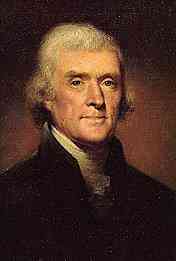
To Thomas Ritchie Monticello, December 25, 1820DEAR SIR,-- On my return home after a long absence, I find here your favor of November the 23d, with Colonel Taylor's "Construction Construed," which you have been so kind as to send me, in the name of the author as well as yourself. Permit me, if you please, to use the same channel for conveying to him the thanks I render you also for this mark of attention. I shall read it, I know, with edification, as I did his Inquiry, to which I acknowledge myself indebted for many valuable ideas, and for the correction of some errors of early opinion, never seen in a correct light until presented to me in that work. That the present volume is equally orthodox, I know before reading it, because I know that Colonel Taylor and myself have rarely, if ever, differed in any political principle of importance. Every act of his life, and every word he ever wrote, satisfies me of this. So, also, as to the two Presidents, late and now in office, I know them both to be of principles as truly republican as any men living. If there be anything amiss, therefore, in the present state of our affairs, as the formidable deficit lately unfolded to us indicates, I ascribe it to the inattention of Congress to their duties, to their unwise dissipation and waste of the public contributions. They seemed, some little while ago, to be at a loss for objects whereon to throw away the supposed fathomless funds of the treasury. I had feared the result, because I saw among them some of my old fellow laborers, of tried and known principles, yet often in their minorities. I am aware that in one of their most ruinous vagaries, the people were themselves betrayed into the same phrenzy with their Representatives. The deficit produced, and a heavy tax to supply it, will, I trust, bring both to their sober senses. But it is not from this branch of government we have most to fear. Taxes and short elections will keep them right. The judiciary of the United States is the subtle corps of sappers and miners constantly working under ground to undermine the foundations of our confederated fabric. They are construing our constitution from a co-ordination of a general and special government to a general and supreme one alone. This will lay all things at their feet, and they are too well versed in English law to forget the maxim, "boni judicis est ampliare juris-dictionem." We shall see if they are bold enough to take the daring stride their five lawyers have lately taken. If they do, then, with the editor of our book, in his address to the public, I will say, that "against this every man should raise his voice," and more, should uplift his arm. Who wrote this admirable address? Sound, luminous, strong, not a word too much, nor one which can be changed but for the worse. That pen should go on, lay bare these wounds of our constitution, expose the decisions seriatim, and arouse, as it is able, the attention of the nation to these bold speculators on its patience. Having found, from experience, that impeachment is an impracticable thing, a mere scare-crow, they consider themselves secure for life; they sculk from responsibility to public opinion, the only remaining hold on them, under a practice first introduced into England by Lord Mansfield. An opinion is huddled up in conclave, perhaps by a majority of one, delivered as if unanimous, and with the silent acquiescence of lazy or timid associates, by a crafty chief judge, who sophisticates the law to his mind, by the turn of his own reasoning. A judiciary law was once reported by the Attorney General to Congress, requiring each judge to deliver his opinion seriatim and openly, and then to give it in writing to the clerk to be entered in the record. A judiciary independent of a king or executive alone, is a good thing; but independence of the will of the nation is a solecism, at least in a republican government. But to return to your letter; you ask for my opinion of the work you send me, and to let it go out to the public. This I have ever made a point of declining, (one or two instances only excepted.) Complimentary thanks to writers who have sent me their works, have betrayed me sometimes before the public, without my consent having been asked. But I am far from presuming to direct the reading of my fellow citizens, who are good enough judges themselves of what is worthy their reading. I am, also, too desirous of quiet to place myself in the way of contention. Against this I am admonished by bodily decay, which cannot be unaccompanied by corresponding wane of the mind. Of this I am as yet sensible, sufficiently to be unwilling to trust myself before the public, and when I cease to be so, I hope that my friends will be too careful of me to draw me forth and present me, like a Priam in armor, as a spectacle for public compassion. I hope our political bark will ride through all its dangers; but I can in future be but an inert passenger. I salute you with sentiments of great friendship and respect. |
